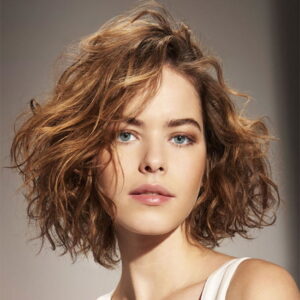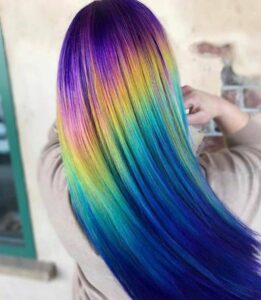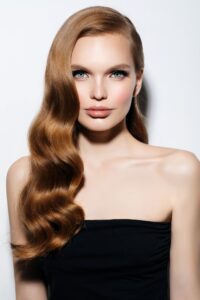Introduction:
African American naturally curly hairstyles are not just a trend; they are a powerful statement of self-expression and cultural pride. For centuries, African Americans have faced societal pressure to conform to Eurocentric beauty standards, often resulting in the use of harmful chemicals and heat styling tools to straighten their hair. However, in recent years, there has been a remarkable shift towards embracing and celebrating natural hair textures. In this article, we will explore the significance of African American naturally curly hairstyles, their impact on self-esteem and cultural identity, and provide inspiration for those seeking to embrace their natural beauty.
The Historical Significance of African American Hair
African American hair has a rich and complex history deeply intertwined with the struggle for racial equality. During slavery, African American men and women were forced to adopt European hairstyles as a means of assimilation and to suppress their cultural identity. Straightening techniques such as hot combs and lye-based relaxers emerged as a result, perpetuating the belief that curly or kinky hair was undesirable.
However, in the 1960s, the Civil Rights Movement sparked a wave of cultural pride and self-acceptance among African Americans. Icons like Angela Davis and the Black Panther Party popularized the afro hairstyle as a symbol of black power and resistance against systemic oppression. This pivotal moment in history laid the foundation for the natural hair movement we see today.
The Natural Hair Movement: A Revolution of Self-Acceptance
The natural hair movement emerged as a response to the societal pressure for African Americans to conform to Eurocentric beauty standards. It celebrates the beauty and versatility of African American hair, encouraging individuals to embrace their natural curls, coils, and kinks. Through online platforms, social media influencers, and grassroots organizations, the natural hair movement has gained significant momentum, empowering individuals to reclaim their cultural identity and redefine beauty on their terms.
The Impact on Self-Esteem and Cultural Identity
The decision to embrace natural hair can have a profound impact on an individual’s self-esteem and cultural identity. For many African Americans, the journey towards self-acceptance begins with learning to love and appreciate their natural hair texture. This process often involves unlearning years of internalized racism and embracing the unique beauty that comes with their natural curls.
By embracing their natural hair, African Americans are able to reject the notion that their hair is “unprofessional” or “unruly.” They are reclaiming their cultural heritage, challenging beauty standards, and sending a powerful message of self-acceptance to future generations. Natural hair has become a symbol of resilience, strength, and pride in one’s heritage.
Breaking the Cycle of Damage
Chemical relaxers and heat styling tools have long been used by African Americans to achieve straight hairstyles. Unfortunately, these practices often result in damage to the hair and scalp, including breakage, dryness, and hair loss. Embracing natural hair allows individuals to break free from this damaging cycle and focus on nurturing and maintaining the health of their hair.
With proper care and maintenance, natural hair can thrive, showcasing its unique beauty and versatility. The use of nourishing products, protective hairstyles, and gentle styling techniques can promote hair growth, enhance curl definition, and improve overall hair health.
Inspiring African American Naturally Curly Hairstyles
Now that we understand the historical significance and the impact of embracing natural hair, let’s explore some inspiring African American naturally curly hairstyles:
1. The Big Chop
The big chop involves cutting off all chemically treated or damaged hair, leaving behind only the natural hair. This bold hairstyle choice is a powerful way to embrace one’s natural texture and start anew. Many individuals find the big chop to be a liberating experience, allowing them to fully embrace their natural beauty.
2. The Wash and Go
The wash and go is a low-maintenance hairstyle that involves washing the hair, applying leave-in conditioner, and allowing the curls to air dry. This style is perfect for individuals who prefer a fuss-free routine and want to showcase their natural curl pattern.
3. Bantu Knots
Bantu knots are a versatile hairstyle that involves sectioning the hair and twisting it into small, coiled knots. This style can be worn as a protective style or unraveled for defined curls. Bantu knots are not only fashionable but also a celebration of African culture and heritage.
4. Twist Outs
Twist outs involve twisting small sections of damp or dry hair and allowing them to dry overnight or using a diffuser. Once the twists are unraveled, they create beautiful, defined curls. Twist outs are a popular choice for achieving a more elongated curl pattern and can be customized to suit individual preferences.
5. Afro Puffs
Afro puffs are a classic and versatile hairstyle that can be achieved by gathering the hair into a high or low ponytail. This style celebrates the natural volume and texture of African American hair while providing a chic and effortless look for any occasion.
Case Studies: The Impact of Natural Hair on Self-Confidence
Let’s explore some real-life case studies that demonstrate the positive impact of embracing natural hair:
Case Study 1: Maya
Maya, a 25-year-old African American woman, spent most of her teenage years straightening her hair to conform to societal beauty standards. However, as she grew older, she became increasingly aware of the damage she was causing to her hair and the negative impact it had on her self-esteem.
Maya decided to embark on a natural hair journey, focusing on nurturing and embracing her natural curls. As her hair grew healthier, Maya noticed a significant boost in her self-confidence. She received compliments from friends and family, who admired her courage to embrace her natural beauty.
Now, Maya proudly wears her natural curls, inspiring others to do the same. She believes that embracing her natural hair has been a transformative experience that has not only improved her self-esteem but also deepened her connection to her cultural identity.
Case Study 2: Michael
Michael, a 32-year-old African American man, spent years struggling with his hair texture. He believed that his tightly coiled hair was unprofessional and opted to keep it shaved or buzzed. However, as he began to see more representation of diverse hairstyles in the media and within his community, Michael started to question these deeply ingrained beliefs.
Encouraged by the natural hair movement, Michael decided to grow out his hair and experiment with different styles. As his hair grew longer, he discovered a newfound sense of pride in his unique curls. He realized that his hair was not a hindrance but a powerful aspect of his identity.
Michael now confidently wears his natural curls and encourages other men to embrace their hair texture. He believes that by challenging societal norms, African American men can redefine masculinity and break free from the limitations imposed by outdated beauty standards.
The Importance of Representation
Representation plays a crucial role in empowering individuals to embrace their natural hair. When individuals see others with similar hair textures and styles being celebrated and represented in the media, it validates their own experiences and encourages them to love and accept their natural hair.
Fortunately, there has been a significant increase in representation of African American naturally curly hairstyles in recent years. From mainstream media campaigns to social media influencers, the visibility of natural hair has grown exponentially. This increased representation helps to redefine societal beauty standards and fosters a sense of pride and acceptance within the African American community.
Conclusion
African American naturally curly hairstyles are more than just a fashion statement; they are a celebration of cultural identity, self-love, and empowerment. By embracing their natural hair, African Americans are defying societal beauty standards, breaking free from damaging hair practices, and reclaiming their cultural heritage.
The natural hair movement has sparked a revolution of self-acceptance and inspired countless individuals to embrace their unique beauty. Through powerful hairstyles like the big chop, wash and go, Bantu knots, twist outs, and afro puffs, African Americans are redefining beauty on their own terms.
As representation continues to grow and individuals share their natural hair journeys, the impact of African American naturally curly hairstyles will only continue to expand. This movement serves as a reminder to all individuals to love and accept themselves as they are, celebrating the beauty of diversity and embracing natural hair as a powerful form of self-expression.
FAQs
Q1: How do I start my natural hair journey?
A1: Starting a natural hair journey involves transitioning from chemically treated or heat-damaged hair to embracing your natural texture. It often begins with the big chop or gradually trimming off the damaged hair. Researching and understanding your hair type, adopting a healthy hair care routine, and seeking support from online communities and resources can be helpful in starting your natural hair journey.
Q2: Are there specific hair care products recommended for African American naturally curly hair?
A2: There are a wide range of hair care products specifically formulated for African American naturally curly hair. Look for products that are free from sulfates, parabens, and other harmful chemicals. Moisturizing shampoos, conditioners, and leave-in treatments are essential for nourishing and hydrating curly hair. Additionally, using oils like coconut oil or argan oil can help seal in moisture and promote healthy hair growth. It’s important to experiment with different products to find what works best for your hair type and needs.
Q3: How can I protect my natural hair while sleeping?
A3: To protect your natural hair while sleeping, consider using a satin or silk pillowcase or investing in a satin or silk bonnet or scarf. These materials help to reduce friction and prevent moisture loss, keeping your curls intact and minimizing frizz. Additionally, you can try pineapple-ing your hair, which involves loosely gathering your hair into a high ponytail or bun on top of your head to maintain your curls overnight.
Q4: How can I style my natural hair for a formal event?
A4: There are many elegant and sophisticated hairstyles that can be created with natural hair for formal events. Some options include updos, braided styles, or twist outs. You can accessorize your hair with decorative pins, headbands, or flowers to add a touch of glamour. Experiment with different styles and consider seeking the help of a professional stylist for special occasions.
Q5: How can I deal with shrinkage in my natural hair?
A5: Shrinkage is a common characteristic of natural hair and occurs when the hair coils or curls tightly, causing it to appear shorter than its actual length. To combat shrinkage, you can try stretching techniques such as twist outs, braid outs, or using heatless stretching methods like banding or African threading. These methods can help elongate the hair and showcase its true length.
Summary
African American naturally curly hairstyles are a powerful symbol of self-acceptance, cultural pride, and beauty. The natural hair movement has allowed individuals to embrace their natural hair textures, breaking free from damaging practices and societal beauty standards. By showcasing inspiring hairstyles like the big chop, wash and go, Bantu knots, twist outs, and afro puffs, African Americans are redefining beauty on their own terms.
The impact of embracing natural hair goes beyond personal transformation; it fosters a sense of empowerment, self-confidence, and cultural connection. Representation plays a crucial role in this movement, as increased visibility of natural hairstyles in media and online platforms helps to redefine beauty standards and inspire others to embrace their natural beauty.
Starting a natural hair journey involves understanding your hair type, adopting a healthy hair care routine, and seeking support from online communities and resources. There are specific hair care products available for African American naturally curly hair, and protecting your hair while sleeping and styling it for formal events are important considerations. Lastly, dealing with shrinkage can be addressed through stretching techniques.
Embracing African American naturally curly hairstyles is not just a trend; it is a celebration of diversity, self-love, and cultural heritage. By embracing natural hair, individuals are sending a powerful message of acceptance and paving the way for future generations to embrace their natural beauty with pride.





